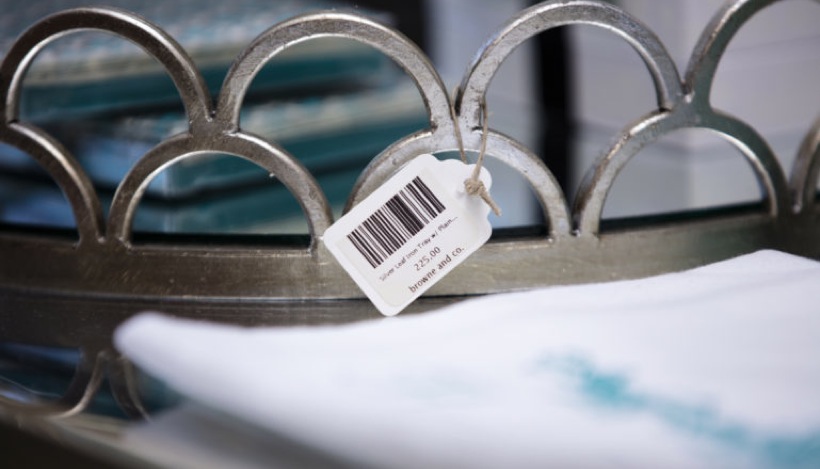UPC barcodes are often the most forgotten component of any product a retailer sells. But don’t be fooled, these seemingly insignificant numbers and zebra-like designs pack a powerful punch, one that small businesses can easily reap the benefits from.
We see them all the time. They are practically on every item we purchase, and yet, most of us (including some small business owners) have no idea what barcodes are used for other than scanning an item at checkout. While there are over a dozen types of barcodes, the most common one used in retail are UPC barcodes.
Before we go any further into the actual benefits of UPC barcodes for small business, let’s first understand what a UPC barcode is. Universal Product Code, or UPC for short, is a unique 12-digit number that is assigned to retail merchandise. These numbers are assigned by the non-profit organization GS1, which develops and maintains global standards for business communication.
Of these 12 digits, the first six digits are the company’s prefix and identify of the company selling the product. The next five numbers are the item reference number and is specific to that particular item. The last number in the sequence is a check digit. The check digit is exactly what it sounds like. It is used to ensure accuracy and “check” for errors. Now that we have that covered, let’s chat a bit about why you want to leverage UPC barcodes for your small business and the benefits of barcodes.
Related: How to Obtain a UPC Code
Leveraging the benefits of UPC barcodes at checkout
As previously mentioned, the most common and recognizable use for barcodes is on retail products scanned during the checkout process. A customer walks into a store and places an item on the counter to purchase. Then, the cashier scans the product’s barcode and ta-da! The product information is magically added to the customer’s order in your point of sale (POS) system and you’re ready to take payment in seconds.
Now, imagine if that product didn’t have a barcode and your customer was purchasing 100 products, not just one. You, as the cashier, have to manually add each item to the order. How much time do you think the customer will stand there waiting for all the items to be rung up and ready for payment?
While there are many variables to take into consideration such as speed of the cashier or duplicate items, the general answer, regardless of the variables, is that the checkout process will take considerably longer without UPCs and barcode scanners. Everybody hates waiting in line, so the quicker you can get the customer checked out, the happier they’ll be.
Products with UPCs and barcode scanning technology not only speed up the checkout process, but they also improve accuracy. We are all human and make mistakes, and retail clerks are no exception. Even if you have an excellent employee who, thus far, has not made a single mistake entering data, just know that most likely, an eventual mistake might occur. And though we don’t advocate for penalizing this employee, that one mistake could cost your business big time.
There is good news, however. In recent years, the cost of barcode scanners has dropped significantly, so taking advantage of the benefits of UPC barcodes won’t have to break the bank. A few reasons for the price decline include a higher demand due to the introduction of tablet-based POS systems that utilize this technology, in addition to new manufacturers in the market capitalizing off of this demand.
Nowadays, you can purchase a barcode scanner for as little as $100 to $200, depending on the product specifications. If you aren’t sure which barcode scanner will work best for your business, there are resources out there that can help you choose the best barcode scanner for your business needs.
From a retail perspective, most of the items you receive from your wholesaler will already be equipped with barcodes, so half of the battle is already done. All you need to do is verify that your point of sale system has the ability to scan barcodes at checkout and what steps you need to take to implement this feature. Nowadays, most POS systems have this capability, so there shouldn’t be an issue finding one that works for you.
Related: Sign up to receive the StartupNation newsletter!
Benefits of UPC barcodes for inventory management
Another area where merchants can benefit from the use of barcodes is inventory management. As essential as this topic is, it is usually a cringe-worthy one for most retailers. Not because they don’t like stocking their shelves with inventory for customers to buy, but because it is often a very time consuming and tedious process for many. This is especially true for those who are not using UPC barcodes for their small business.
When a small business owner receives products from their supplier, one of the first steps they take is to “check-in” the items. This usually means a quick once over to make sure nothing is damaged, adding the items to inventory, and then stocking the shelves.
Typically, there are a number of items included in a single delivery. While this is standard practice, it does add a layer of complexity to the intake process. The more products to manage at one time, the more opportunity there exists for data entry errors, particularly if it’s a manual process.
If an error is made during intake, the possibility of that error being caught is quite slim. It can quickly become a “looking for a needle in a haystack” type of scenario, which is something that no retailer has time for.
This is where another benefit of the use of UPCs and a barcode scanner come into play. The process can be done rather quickly and usually within a matter of minutes. You simply scan the UPC code, enter the quantity received, save the updated information and move onto the next item. No need to double check the data for errors because it’s all included perfectly in the code. Additionally, the technology has also gotten easier to implement. A lot of the barcode scanners are “plug-and-play” so you can simply take it out of the box, plug it in (or connect via Bluetooth) and you’re ready to go.
When you first start your business, it can feel like money flies out of your pocket much quicker than it comes in. Although that’s normal, it might make you a little apprehensive to spend a couple hundred dollars on a barcode scanner, an item that’s deemed an “accessory” to your POS system or inventory management software. Before you make any rash decisions and think these accessories are not a necessity, take a minute to understand the benefits of UPC codes and barcode scanning technology.






